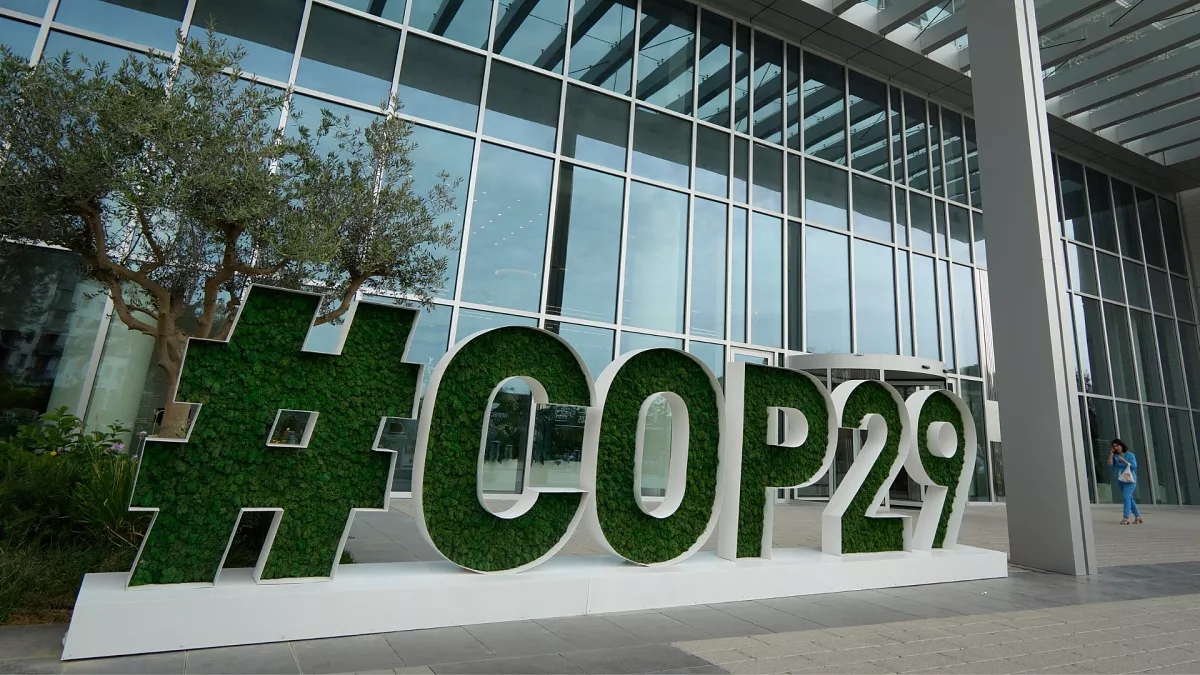COP29: The Race Against Time in Climate Action
COP29: The Race Against Time in Climate Action

The 29th United Nations Climate Change conference, commonly known as COP29, commenced on November 11, 2024, in Baku, Azerbaijan.
As the world grapples with escalating climate crises, this conference emerges not just as a meeting but as a pivotal moment where global leaders, activists, and stakeholders convene to define the trajectory of our planet's environmental future. The stakes are high, with climate adaptation, mitigation, resilience, and finance topping the agenda, amidst a backdrop of global political shifts and ongoing conflicts.
Can The World Turn the Tide on Climate Change?
COP29 unfolds in a geopolitical environment fraught with tension. The absence of some world leaders, due to elections or conflicts elsewhere, has sparked discussions on the commitment of nations to climate action. Despite this, the conference has seen active participation from delegates of developing countries, aiming to forge compromises on critical issues like finance for climate adaptation.
Adaptation and Resilience: With climate impacts becoming more severe, the focus on adaptation strategies has never been more urgent. COP29 aims to enhance the global framework for adaptation, ensuring that nations, especially those most vulnerable, have the resources to build resilience against climate change effects like rising sea levels, extreme weather events, and food insecurity.
Mitigation Efforts: The conference continues the push from previous COPs to reduce greenhouse gas emissions drastically. New commitments to transition from fossil fuels to renewable energy sources are expected, with discussions on how to make these transitions equitable and economically viable for all countries.
Climate Finance: One of the most contentious issues at COP29 is climate finance. Developed nations are under pressure to meet and exceed the $100 billion annual pledge to assist developing countries. Innovations in funding mechanisms, such as carbon markets under Article 6 of the Paris Agreement, are being scrutinized for their effectiveness and ethical implications.
Key Discussions and Debates
Article 6 and Carbon Markets: There's been notable controversy surrounding the methodologies and standards for carbon trading. Recent decisions by the Article 6.4 Supervisory Body have raised concerns about the integrity of these markets, potentially leading to greenwashing rather than genuine reductions in emissions.
Loss and Damage Fund: Discussions on operationalizing the Loss and Damage fund, agreed upon in previous COPs, are crucial. This fund aims to provide financial assistance to nations hit hardest by climate impacts, which they cannot adapt to, for phenomena they did not significantly contribute to.
Global Stocktake: Following the first-ever Global Stocktake at COP28, COP29 seeks to refine the processes by which countries report their progress towards Paris Agreement goals. This includes enhancing transparency and accountability in national climate action plans.
Challenges and Opportunities of COP29
The shadow of geopolitical tensions, including wars and political instability, looms large over COP29. However, these challenges also present unique opportunities:
Technology and Innovation: Advances in technology, like AI in climate modeling and renewable energy solutions, are at the forefront. COP29 is a platform for showcasing how technology can be leveraged for climate resilience and mitigation.
Youth and Activism: The youth movement for climate action has gained momentum, with young activists pushing for more aggressive climate policies. Their voices could significantly influence the outcomes of COP29, urging for long-term commitments that extend beyond current political cycles.
The Role of Major Players
United States: The U.S. stance on climate issues has been pivotal. With elections influencing policy, there's a cautious optimism about maintaining or even enhancing climate commitments despite the political climate.
China: As the world's largest emitter, China's actions at COP29 will be closely watched. Its dual role as a major investor in renewables and a significant user of coal makes its policy decisions crucial for global climate goals.
European Union: The EU continues to be a leader in climate policy, potentially pushing for stricter regulations and higher targets for emission cuts, leveraging its influence through climate diplomacy.
Expectations and Realities of COP29
Concrete Action Plans: Moving beyond promises to action, particularly in funding mechanisms and technology transfers.
Inclusion of Indigenous Voices: Ensuring that indigenous knowledge and rights are integrated into climate solutions, providing a holistic approach to environmental stewardship.
Azerbaijan's Role: As host, Azerbaijan has the opportunity to showcase its environmental initiatives, despite criticisms regarding its governance. Its energy sector, traditionally reliant on oil, faces a moment to transition towards sustainable practices.
COP29 in Baku represents a critical juncture for international climate policy. The outcomes could dictate the pace and nature of global climate action for years to come. While the conference is shadowed by global political and economic challenges, it also reflects a collective resilience in the face of adversity. The global community watches, hopes, and participates, knowing that the decisions made here will echo through decades, affecting climate futures worldwide. The call to "stand and deliver" by UN Climate Change Executive Secretary Simon Stiell encapsulates the essence of COP29 – a moment for action, compromise, and forward-thinking in the quest to stabilize our planet's climate.
As the conference progresses, the world remains tuned in, eager for signs of progress that could herald a new era of climate responsibility and cooperation.
Trending
1 Eco-Conscious Kids: A Guide to the Best Sustainable Outdoor Toys
Susanna Koelblin2 Deep Tech Ethics Trifecta: Building a Responsible and Sustainable Global Innovation Ecosystem
Dr. Ingrid Vasiliu-Feltes3 Understanding Downdraft Tables: Enhancing Your Welding Environment
Daniel Hall4 Harnessing Machine Learning for a Sustainable Future
Ahmed Banafa5 Electrical Bus Bars: The Backbone of Electrical Systems
Daniel Hall

